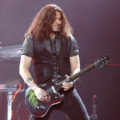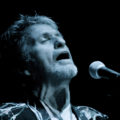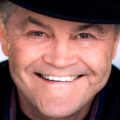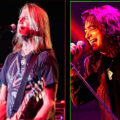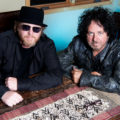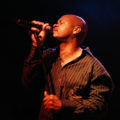Solitude breaks near 20-year solo silence for The Hooters’ superstar songwriter Eric Bazilian
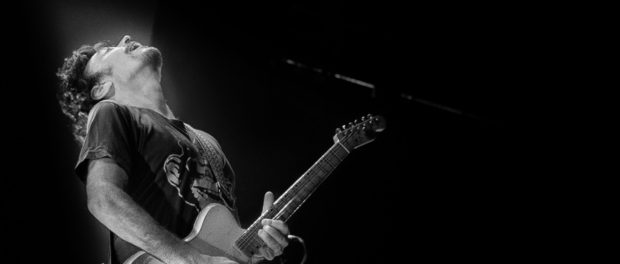 Photo provided by Dallyn Pavey / Dish Public Relations
Photo provided by Dallyn Pavey / Dish Public Relations
It wasn’t exactly Eric Bazilian’s intention to take 19 years between solo albums, but thanks to commitments with multi-platinum rock band The Hooters (“And We Danced,” “Day By Day,” “All You Zombies,” “500 Miles,” “Private Emotion”) and writing for superstars of every stripe (Bon Jovi, Santana, Carrie Underwood, Ricky Martin, Robbie Williams), the decades simply slipped away.
Nonetheless, the Philadelphia native with another residence in Sweden, found pandemic-forced solitude to be exactly what he needed to put finishing touches on pre-existing ideas and craft others entirely from scratch for a collection called “Bazilian.”
The singer/songwriter, multi-instrumentalist and producer rang Chicago Concert Reviews to preview these topical and thought-provoking tunes, along with being constant MTV fixtures with the enviable act that kicked off Live Aid, helping Cyndi Lauper get off the ground and fully conceiving Joan Osborne’s omnipresent, endlessly analyzed “(What If God Was) One Of Us.”
 Did you intend to isolate in Sweden or were you unable to get back to America?
Did you intend to isolate in Sweden or were you unable to get back to America?
Eric Bazilian: I sort of relocated here with my family in 2017. My wife is Swedish and my two younger children are half Swedish, very binational and bilingual. Since I was going to be traveling a lot anyway, we thought we would semi-relocate here for a while. It was a big year in 2020 for The Hooters with our 40th anniversary tour. I was gonna be back and forth a great deal. Then, of course, the pandemic happened…
Was the new project birthed out of this situation?
Bazilian: This was situational, definitely. I really hadn’t done a true solo project since 2002. I’ve done a number of collaborations since then, but I didn’t know if I was ever gonna have the juice to do a solo record. The first song that I did was a cover of The Beatles’ “Help!” I did a total reboot, reimagining of it. I liked it and everyone seemed to really like it, so I released that in April [of 2020]. Then I thought “you know, I’ve got all of these songs all of a sudden. Maybe this is a solo album?” I just kept going, and going, and going.
What’s the story behind the lead-off single, “Heaven Ain’t Gonna Save Us”?
Bazilian: I actually wrote that song the day after the presidential election in 2016. Originally, it had a very different vibe musically and then I had this revelation in early 2017 that it really wanted to sound like The Beatles’ “Revolution,” so I retooled it and re-recorded it. At that point, the news cycle of the election had passed and I just let it sit. And then come summer/fall 2020, I’ve got this body of work that’s looking like a solo record and I listened to that song. I said “you know what, we’ve got an election coming up. That belongs here.” I did a little bit of tweaking on the recording, because originally it was a total “Revolution” knock off, just all fuzzy guitars and very low-fi sounding. “I’m gonna put a mandola on it, I’m gonna high-fi it up a bit” and then that became the first single.
Your follow-up, “I Miss Everything,” seems even more timely and topical.
Bazilian: That song, and really most of the songs on the album, are relevant to the current pandemic situation. But for me, they really come from my feeling like I’m living here in exile, 4,000 miles from all my stuff, which is sitting unattended in a studio in Pennsylvania. Until March of 2020, I was back and forth a bunch, able to scratch that itch when I wanted to. “I Miss Everything” just started one morning in my basement here. A major player in this whole chain of events is the fact that we’re renting an apartment here in Stockholm and studio space is very hard to come by. But as it turns out, the basement in the building has a large room that no one’s using. The neighbors are all very friendly and encouraging to me to use it as a studio.
 So I have my laptop, I have a little interface, a couple of microphones, some instruments and I’m able to make records. One morning, I went down there. I started playing guitar and I started singing. The first words out of my mouth were “I Miss Everything” and I just went down that road. The song really wrote itself. It was all stream of consciousness. Everything is true, the collection of guitars, the piano, which my mother many years ago gave to me, and the car, which really was crushed by a tree during a major storm in Pennsylvania.
So I have my laptop, I have a little interface, a couple of microphones, some instruments and I’m able to make records. One morning, I went down there. I started playing guitar and I started singing. The first words out of my mouth were “I Miss Everything” and I just went down that road. The song really wrote itself. It was all stream of consciousness. Everything is true, the collection of guitars, the piano, which my mother many years ago gave to me, and the car, which really was crushed by a tree during a major storm in Pennsylvania.
Is there a theme throughout the tunes?
Bazilian: The theme sort of decided itself. The theme is really all about “where am I?” “Where is home?” There’s a song called “Where Home Is,” which I wrote probably in 2018. The song begins kind of like “okay, where am I? Who am I?” Then by the end, it turns into “now I know where home is,” because really home is wherever I am, where I’ve got people that matter to me and where I can make music.
How about musically? Give us a sample of your influence pool.
Bazilian: I’m a rock musician. To me, when I hear a record, I need to be able to see everything that’s being played, so I want to see a drummer, I want to see a guitar player, I want to see a keyboard player and I want to see the singers. Everything in my music is created by human hands. All the drums are real drums, played by either David Uosikkinen,
The Hooters drummer from Philadelphia, or a drummer friend of mine from Slovenia. Electric guitar is my first instrument, so there’s a lot of that on it. In recent years, the Swedish mandola has become my main writing instrument. Almost all of the songs are based around a mandola with a lot of support by electric guitars, bass and drums. It is a rock album, although since this has some acoustic instruments, it might be construed as a folk rock album. If that makes it fit in that genre, fine. I don’t really think about genres. To me, genres are just a fool’s game. Nowadays, everything seems to be a genre, a tribe, so whichever ones I can fit into, I’m fine.
What initially made you decide to go solo around 2000?
Bazilian: Well, I never went solo. I just realized I had a whole identity, a whole body of work and stories that I wanted to tell that didn’t really fit into The Hooters’ world. What better way than by making solo records in between everything else? By the way, we never broke up. We never said “we’re not The Hooters anymore.” We did our last show at the end of 1995 and then we started touring again in 2003, so it was an eight-year break. The whole thing started up again in November 2001 when we played a concert in Philadelphia. I just remember standing on stage with those guys [and wondering] “what have we been thinking? This is the best band I’m ever gonna be in.” We’ve actually been active since 2003, which is longer than we had been active before we took our break.
 Going back to The Hooters’ breakthrough, why do you think “Nervous Night” stood out?
Going back to The Hooters’ breakthrough, why do you think “Nervous Night” stood out?
Bazilian: We never went with the trends. Back then in ‘84/‘85 when we made that record, everything was drum machines, digital synthesizers and very stiff sounding. That album was all real sounds being made by real people, and for the most part, real lyrics telling real stories. We weren’t trying to be obscure. We were just telling it the way we saw it. I don’t think we really fit into the ‘80s mold, although we sure do show up on a lot of ‘80s playlists. If anything, I think we were a ‘70s band who had survived into the ‘80s. The band actually started in 1980, but Rob [Hyman] and I started working together in the 70s.
What did it look like during the days of dominating MTV?
Bazilian: It looked awesome. Are you kidding me? We went from total obscurity, although we had built an amazing local following in Philadelphia. We were The Beatles of Philadelphia in the ‘80s. All of a sudden, we’re all over MTV with songs about Moses and Noah, songs with mandolins and melodicas, all of that stuff that nobody was doing at the time. It was very rewarding and affirming for us.
How would you outline the changes that came with “One Way Home” and “Zig Zag?”
Bazilian: We didn’t feel like it was that much of a change, going from “Nervous Night” to “One Way Home.” I think we just became a bit more of what we already were. We definitely did a deeper dive into that folk/Americana influence than we had made before. It’s funny how it went for us career wise. “One Way Home” did okay in the U.S., but it was really Europe where it caught hold. That’s when our love relationship with Germany began. “Johnny B” became a top ten record there. And then going into “Zig Zag,” which was more of that folk rock thing, that brought us to Sweden, which is why I’m here now. During that time, I met my wife and became sort of half Swedish…We came to Stockholm and played at the Concert Hall to a sold out crowd who knew the words to every song, especially the songs on the album that was spelling the end of the day for us in America. That’s when I saw that the band was going to have a long and fulfilling career wherever we were.
What are your reflections on being part of the monumental Live Aid, Amnesty International’s “A Conspiracy Of Hope” and Roger Waters’ all-star staging of Pink Floyd’s “The Wall”?
Bazilian: Live Aid happened so fast, a lot of it is a blur. I remember we were on a mini tour of the U.S. with Don Henley and we got the phone call. “You guys are gonna be home for two days, and one of them, you’re gonna play at Live Aid.” It totally made sense because the concert was going to be in Philadelphia and we were the obvious artists that would represent our hometown during the show. The whole thing happened so quickly. We played for ten minutes. We did two songs. I just remember we took an elevator up to the stage, walking out and seeing 120,000 people and going “okay, here we go!” I wasn’t even thinking about the billion people who were watching it on TV at the time. We just did our thing, which is what we always do, and then Amnesty came along at the end of the tour for “Nervous Night.” We were more psychologically prepared for it. I think I was more present.
 And then “The Wall” happened in 1990. We played in London, I believe in early 1990, and Roger Waters came to our show there and introduced himself. He extended his hand and said “hi, I’m Roger. I’m your fan,” which was some tremendous wish fulfillment because when we were making the “All You Zombies” record, we were always asking ourselves “what would Roger do here?” We were inspired by the musical aesthetic of “The Wall” album, trying to please Roger, and turned out it worked because he came to see us. A few months later, we were on tour in Japan and we got a phone call. “Can you guys be in Berlin in five days?” So we flew home, had a couple of days, then we went off to Berlin and there we were. Roger was incredibly open and accommodating to us. I think he was very glad to have us there.
And then “The Wall” happened in 1990. We played in London, I believe in early 1990, and Roger Waters came to our show there and introduced himself. He extended his hand and said “hi, I’m Roger. I’m your fan,” which was some tremendous wish fulfillment because when we were making the “All You Zombies” record, we were always asking ourselves “what would Roger do here?” We were inspired by the musical aesthetic of “The Wall” album, trying to please Roger, and turned out it worked because he came to see us. A few months later, we were on tour in Japan and we got a phone call. “Can you guys be in Berlin in five days?” So we flew home, had a couple of days, then we went off to Berlin and there we were. Roger was incredibly open and accommodating to us. I think he was very glad to have us there.
On the subject of shows, what are your Chicago recollections? It’s been quite a while.
Bazilian: Yeah, it has. I think the last time we played in Chicago was ‘93 [at The Cubby Bear], which was probably the last real, full U.S. tour we did. By that time, our fortunes in the U.S. had diminished, to say the least. We were a great opening act. I know we played the arenas in Chicago, both with Loverboy and Bryan Adams. We may have played there even with Squeeze on our tour in ‘85. I remember having great shows in Chicago. It became very challenging for us to tour the U.S. because we tour in Germany, we play in the Philadelphia area and we’re a headliner. We have great production. At this point, for us to play in Chicago would be a lot of fun, but we’d be playing for probably a hundred people and it would not pay for the gasoline in our bus…We headline festivals in Germany and Scandinavia. The last time we played in Sweden, we played at Sweden Rock, which had 40,000 people.
Are there any rough draft touring plans at the moment?
Bazilian: I would like to perform this album live with a band and with real audiences. My plan now is, hopefully by summer, the world will have gotten to a point where The Hooters can actually do our 40th anniversary. Then when that is finished, I would like to go out and start performing this album with a band…
As a songwriter, your material’s been recorded by practically everyone in so many genres. Who are a few you feel would surprise people?
Bazilian: I think to a lot of people, it was a bit of a surprise that that I wrote a bunch of songs with the Scorpions. But for me, it made total sense because really at heart, I’m a hard rocker. I grew up in the ‘60s and ‘70s. My heroes were the guitar gods: [Eric] Clapton, [Jimi] Hendrix, Jeff Beck and Jimmy Page. The source of all my energy is really from playing rock guitar. It was totally natural for me to work with the Scorpions.
A lot of the more pop artists that I’ve worked with, like Ricky Martin, came through my relationship with [songwriter/producer] Desmond Child. It was a great piece of luck that I’ve gotten to do all the things I’ve done with Ricky, who’s a great artist in a completely different genre for me. I’ve worked with a folk rock artist in Ireland named Una Healy. I’ve worked with a total electro pop artist in Finland, Sara Aalto, the past couple of years. My policy is “just say yes” because I get inspired by everything. Really the farther from my comfort zone it is, the better.
You have a longstanding relationship with Cyndi Lauper. Can you dive into working with her?
 Bazilian: In 1982, The Hooters were reaching our peak in Philadelphia and signed to play in New York a little bit. At the same time Rick Chertoff, who was our longtime collaborator/producer, had been assigned Cyndi to produce at Epic Records. He brought her to see us at The Bottom Line and we all decided we were gonna be her band for her first album [“She’s So Unusual”]. We spent six months in Philadelphia working on arrangements for all these songs [including “Girls Just Want To Have Fun”] that Rick had brought, some of which Cyndi had written, then we went to New York to record her album. During that time, she and Rob Hyman wrote “Time After Time.” We did not know we were making an iconic record. We knew that we were making a very different album and it was never a dull moment working with Cyndi. I am the guitarist on that album, along with Rob and Rick being arrangers. I played saxophone and melodica, as well and did some backing vocals. I actually played “the hooter” on “Money Changes Everything.”
Bazilian: In 1982, The Hooters were reaching our peak in Philadelphia and signed to play in New York a little bit. At the same time Rick Chertoff, who was our longtime collaborator/producer, had been assigned Cyndi to produce at Epic Records. He brought her to see us at The Bottom Line and we all decided we were gonna be her band for her first album [“She’s So Unusual”]. We spent six months in Philadelphia working on arrangements for all these songs [including “Girls Just Want To Have Fun”] that Rick had brought, some of which Cyndi had written, then we went to New York to record her album. During that time, she and Rob Hyman wrote “Time After Time.” We did not know we were making an iconic record. We knew that we were making a very different album and it was never a dull moment working with Cyndi. I am the guitarist on that album, along with Rob and Rick being arrangers. I played saxophone and melodica, as well and did some backing vocals. I actually played “the hooter” on “Money Changes Everything.”
What’s your perspective on the varying ways “One Of Us” has been interpreted from the moment it became a massive hit for Joan Osborne?
Bazilian: I find it funny that a song I wrote literally in the time that it takes to sing it has raised so much controversy and so many questions. I get a lot of emails, still, from people all over the ideological spectrum. I get a lot from believing Christians who think that I’m one of them. I am not. I get a lot from Hebrews who think that I am one of them, and I am, although I’m not practicing in the faith that I grew up in. And then I also get a lot from atheists, who get it because, in fact, the song has nothing to do with God. It’s about the poor guy on the bus trying to get home…
I wrote that song very quickly one night in January 1994, just to show my new girlfriend from Sweden, who is now my wife of many years, how I make a song. I had a four-track cassette recorder and I recorded a guitar riff. She said “sing it,” and I sang it, and that’s what came out. The next day, I brought my little demo into our writing session with Joan and played it. Rick Chertoff, the producer, said “Joan, do you think you could sing that?” The first time I heard Joan sing it, I think we all knew that voice and that song was a home run.
Is there anything else behind the scenes or as an artist that we haven’t covered?
Bazilian: I’ve spent a lot of time in the past years working with new, unknown artists trying to make something catch fire. There’s an artist in Philadelphia named Alexis Cunningham. Our collaboration is called Alexxis And The Medicine and I’m waiting for the world to open up again so I can start releasing the body of work that we have because it’s world power music. I met her seven years ago when she was 21 and I recognized an unstoppable musical force as a writer, singer and artist.
When I started approaching my contacts in the business about having a new solo album, a lot of them said “now is not the time. You should sit on it.” I know the landscape now. I know that the chances of having a worldwide hit now are infinite decimal. I just felt like now is the time to start releasing my solo work, for better or worse. I’m not getting any younger [laughs].
For additional information on Eric Bazilian, visit EricBazilian.com.


